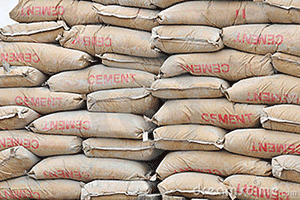Dangote Cement introduced 42.5N cement and, earlier this year, upgraded it to 52.5N – only to trigger a fight back from competitors who felt pushed to the wall. Stakeholders relegated to the background traditional marketing formats and instead adopted intrigue and blackmail.
Rising demand
Demand for cement in the country is on the rise, according to Dangote Cement, one of the major local manufacturers. The company disclosed that demand grew 14 per cent to 11 million tonnes (mt) in the first half of last year, with March recording the highest ever monthly sales of 2mt.
Demand in second quarter 2013 was stronger than in the first quarter, despite seasonally better weather conditions in the first quarter, said Renaissance Capital, an investment bank.
Cement import has reportedly declined significantly, with less than half the 1.3mt imported in first half 2013 sold in that quarter. However, Dangote Cement’s market share was estimated at 62 per cent in the first half of last year, despite increasing production 29 per cent to 6.8mt in the period.
Cement grades
Prior to the introduction of 52.5N grade, which has divided stakeholders, there was a popular 32.5 which was adopted by Bua Cement, Dangote Cement, and Lafarge WAPCO, among other smaller players.
Other grades before the introduction of 42.5 and 52.5 included 12.5 and 22.5.
Trade Union Congress of Nigeria (TUC) President, Bobboi Kaigama, said there are “about 27 types of cement over the world, and each supports different purposes.
“They include grades 12.5, 22.5, 32.5, 42.5, 52.5 sulphate resistant cement, oil well, white cement and others. None of them is inferior to others, and no one size fits all circumstances.”
Enter new grades
In March this year, Dangote Cement rolled out 42.5N, which was adopted as the approved grade in Nigeria, against the traditional 32.5.
While the market was yet to wake up from the shock of 42.5, Dangote introduced 52.5N to offer consumers a variety of quality products, as the company put it.
Dangote Cement Managing Director, Devakumar Edwin, told a group of block makers who visited his office that the new grade would be produced alongside 42.5, and that Dangote Cement is determined to rid the market of lower quality cement.
According to him, the launch of the new grade was one of the responses of Dangote Cement as a leading manufacturer of the commodity in Africa to stem the tide of building collapse caused by poor quality cement.
Edwin said the 52.5N had been the standard before Dangote Cement decided to produce it to add to the options available in the market.
The new brand is produced in all the company’s three plants in Ibese (Ogun State), Gboko (Benue), and Obajana (Kogi).
Edwin confirmed that despite higher production cost, 52.5N would sell for the same price as 42.5 because “it is in the interest of our customers to make it affordable.”
Face off
Immediately the new cement was introduced by Dangote Cement and it moved to have the government adopt it as the approved standard, Lafarge WAPCO went to the Federal High Court to stop the Standard Organisation of Nigeria (SON) from the plan.
But the court ruled that making such a restraining order would prejudice its order compelling the defendants to appear in court to show cause why they should not be restrained from enforcing the new cement grade.
Why new grades
Several buildings have collapsed in Nigeria in recent times. Some attributed it to low grade cement but others blame builders for failing to adhere to specifications.
TUC Secretary General, Musa Lawal, weighed in by declaring that “any bid to ban the use of 32.5 cement grade (or any other cement grade for that matter), as being canvassed by the SON, will lead to loss of thousands of jobs because most of the factories will have no choice than to shut down.”
Blackmail to stop raising standards
But the Coalition against Building Collapse (CABCO) condemned the “blackmail” in the opposition to the new cement standard meant to end building collapse and align Nigeria with global practices.
CABCO Secretary General, Clement Orimade, expressed dismay that instead of complying with the new guidelines to save lives and property, some stakeholders knock lawmakers and the SON, thereby deceiving the public.
“We have noted with dismay a well-orchestrated campaign of blackmail, misinformation and threat being visited on the SON with the aim of forcing a policy reversal that will prolong Nigeria’s losses to building collapse.
“When they get tired of blackmailing the SON, they turn to the House of Representatives which have voted in favour of enforcement of the new cement standard,” Orimade said in a statement.
CABCO reiterated its earlier stand that cement contributes to building collapse, the same position articulated by Ashaka Cement.
CABCO insisted that labelling and traceability, part of the new requirements, are long overdue, noting that cement manufacturers have cheated consumers for too long through non-disclosure of important facts of their products.
“Manufacturers who are kicking against the inclusion of cement grade, batch number and expiry date on the labelling want to perpetuate the cheating into a new era where the versatile 42.5 has become the mandatory all-purpose cement grade in Nigeria.
“They should count themselves lucky that consumers haven’t sued them for failing to give full disclosure of the facts of the cement they sell.”
Final take
CABCO also dismissed the claim that it will take manufacturers of 32.5 two years to change to 42.5, describing it as another falsehood in the callous effort to keep Nigerians buying the lower grade and suffering the consequences.
It claimed that its technical experts have discovered that, contrary to what opponents of the new standard are saying, conversion of a 32.5 production line to a 42.5 production line requires neither new buildings nor new manufacturing equipment but adjustment of the combination and preparation of ingredients.













